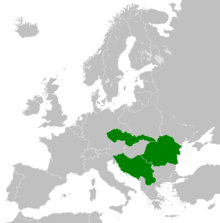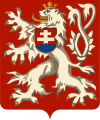Czechoslovakia–Yugoslavia relations
Czechoslovakia |
Yugoslavia |
|---|---|
 | |
Czechoslovakia |
Yugoslavia |
|---|---|
Czechoslovakia–Yugoslavia relations were historical foreign relations between Czechoslovakia and Yugoslavia, both of which are now-defunct states. Czechoslovakia and the Kingdom of Serbs, Croats and Slovenes were both created as union states of smaller Slavic ethnic groups. Both were created after the dissolution of Austria-Hungary, itself a multinational empire unable to appease its Slavic populations or implement a trialist reform in its final years.
History
During the Austro-Hungarian time the Charles University in Prague and other Czechoslovak institutions of higher education became important center of higher education for South Slavic students with students and graduates including Veljko Vlahović, Ratko Vujović, Aleksandar Deroko, Nikola Dobrović, Petar Drapšin, Zoran Đorđević, Lordan Zafranović, Momir Korunović, Branko Krsmanović, Emir Kusturica, Ljubica Marić, Goran Marković, Predrag Nikolić, Stjepan Radić, Nikola Tesla and other.
Interwar period

Czechoslovak delegates at the Paris Peace Conference of 1919 put forward a proposal to carve out a strip of land between Austria and Hungary to serve as a corridor between the two newly established Slavic countries with shared political and economic interests. Acting against Italian interests, the proposal to form the Czech Corridor was ultimately rejected.[1]
In 1921, together with the Kingdom of Romania, Czechoslovakia and Yugoslavia established the Little Entente with the purpose of common defense against Hungarian revanchism and the prospect of a Habsburg restoration. Czechoslovakia and Yugoslavia signed their agreement on 4 June 1920[2] In 1923 Czechoslovak Republic bought attractive plot in the Bulevar kralja Aleksandra for its new representative diplomatic mission, and the plot was subsequently enlarged in 1931.[3] The laying of the cornerstone was organized on the day of St. Václav the Good day in 1925 with Deputy Minister of Foreign Affairs J. Marković, representatives of the Association of National Minorities in the Kingdom of Serbs, Croats and Slovenes, Mayor of Belgrade Bobić and Head of Department in the Czechoslovak Ministry of Foreign Affairs Dr. Ribarž in attendance.[3]
Cold War period
Both Czechoslovakia and Democratic Federal Yugoslavia were among 51 original member states of the United Nations. Close relations between the two states were canceled after the Tito–Stalin split of 1948. Yugoslavia supported reformist Alexander Dubček and political liberalization in Czechoslovakia which took place in the period of Prague Spring. Contrary to its verbal support to Soviet intervention in Hungary in 1956, Yugoslavia strongly condemned the Warsaw Pact invasion of Czechoslovakia in 1968. On 12 July 1968 President of Yugoslavia Josip Broz Tito gave an interview to Egyptian daily Al-Ahram where he stated that he believes that Soviet leaders are not "such short-sighted people [...] who would pursue a policy of force to resolve the internal affairs of Czechoslovakia".[4] President Tito visited Prague on 9 and 10 August 1968, just days before the intervention while large group of 250,000 demonstrators gathered in Belgrade once the intervention started.[4] Yugoslavia provided refuge for numerous Czechoslovak citizens (many on holidays) and politicians including Ota Šik, Jiří Hájek, František Vlasak and Štefan Gašparik.[4] 1969 Non-Aligned Consultative Meeting was held in Belgrade following the events in Czechoslovakia.
Post 1989 relations
Both federal states faced rising economic and nationalist challenges in late 1980's, issues that culminated in the violent breakup of Yugoslavia in what is known as the Yugoslav Wars-a situation that contrasted sharply with the peaceful dissolution of Czechoslovakia. Contrary to what was seen following the dissolution of the Soviet Union, wherein the Russian Federation was internationally recognized as the sole successor state of the USSR, none of the former Czechoslovak or Yugoslav constituent republics achieved such status. The Czech Republic and Slovakia reached an agreement on shared succession based on which both had to reapply and rejoin all international organizations and agreements. Nevertheless the Czech Republic unilaterally decided to keep the old flag of Czechoslovakia as its own flag (despite being contrary to the agreement), but avoided any claim on sole succession. In the Yugoslav case, the Federal Republic of Yugoslavia (Serbia and Montenegro) initially asserted that it was the sole legal successor state to the Socialist Federal Republic of Yugoslavia but their claim which was rejected by U.N. Security Council Resolution 777. The Arbitration Commission of the Peace Conference on Yugoslavia asserted in its Opinion No. 1, that the Socialist Federative Republic of Yugoslavia is in the process of dissolution while Opinion No. 10 stated that the FRY (Serbia and Montenegro) could not legally be considered a continuation of the former SFRY, but it was a new state. After initial resistance to this legal opinion (partially supported by certain Non-Aligned countries), The so-called Federal Republic of Yugoslavia accepted shared succession after the overthrow of Slobodan Milošević. In the process of peaceful dissolution of state union between Serbia and Montenegro in 2006 Montenegro accepted that Serbia remain the sole successor of their union, inheriting international rights and obligations, notably the guaranty of territorial integrity from the United Nations Security Council Resolution 1244.
As Czechoslovak Federation continued to exist until 1993, the country established bilateral relations with some newly independent and recognized post-Yugoslav states over the course of 1992.
-
Former Embassy of Yugoslavia in Prague (today Embassy of Serbia)
-
Former Embassy of Czechoslovakia in Belgrade (today Embassy of Czech Republic)
-
Mausoleum of Yugoslav Soldiers in Olomouc
See also
- Bled agreement (1938)
- Croatia–Czech Republic relations
- Croatia–Slovakia relations
- Czechs of Croatia
- Czechs in Serbia
- Croats in Slovakia
- Slovaks of Croatia
- History of Orthodox Church of the Czech Lands and Slovakia
- Intermarium
- Macedonians in the Czech Republic
- Mausoleum of Yugoslav Soldiers in Olomouc
- Nova borba
- Prague Slavic Congress, 1848
- Serbs of Slovakia
- Slovaks in Serbia
- Slánský trial
- Dissolution of Austria-Hungary
- Death and state funeral of Josip Broz Tito
- Czech Republic – Serbia relations
- Serbia–Slovakia relations
- Czechoslovakia at the 1984 Winter Olympics
References
- ^ Perman, D. (1962). "The Shaping of the Czechoslovak State: Diplomatic History of the Boundaries of Czechoslovakia, 1914-1920". Studien zur Geschichte Osteuropas. 7. E. J. Brill: 146–148. ISBN 978-90-04-62309-5. OCLC 1087196404.
- ^ "UGOVOR O ODBRAMBENOM SAVEZU IZMEDjU KRALjEVINE SHS I REPUBLIKE ČEHOSLOVAČKE, Beograd, 14. avgust 1920". Ministry of Foreign Affairs (Serbia). Retrieved 31 July 2020.
- ^ a b "Zgrada Ambasade Republike Češke u Beogradu". Ambasada Republike Češke u Beogradu. Retrieved 31 July 2020.
- ^ a b c "Pet decenija od sovjetske invazije na Čehoslovačku – jugoslovenske refleksije". Danas. 19 August 2018. Retrieved 31 July 2020.
Further reading
Books
- Vojtechovsky, Ondrej (2016). Iz Praga protiv Tita : Jugoslavenska informbiroovska emigracija u Čehoslovačkoj. (in Serbo-Croatian) [English: From Prague v. Tito: Yugoslav Informbureau Emigration in Czechoslovakia]. Zagreb: Moderna vremena.
Articles
- Czechoslovakia–Yugoslavia relations
- Bilateral relations of Czechoslovakia
- Bilateral relations of Yugoslavia
- Czech Republic–Serbia relations
- Bosnia and Herzegovina–Czech Republic relations
- Croatia–Czech Republic relations
- Czech Republic–Kosovo relations
- Czech Republic–Montenegro relations
- Czech Republic–North Macedonia relations
- Czech Republic–Serbia and Montenegro relations
- Czech Republic–Slovenia relations
- Serbia–Slovakia relations
- Bosnia and Herzegovina–Slovakia relations
- Croatia–Slovakia relations
- Montenegro–Slovakia relations
- North Macedonia–Slovakia relations
- Serbia and Montenegro–Slovakia relations
- Slovakia–Slovenia relations






